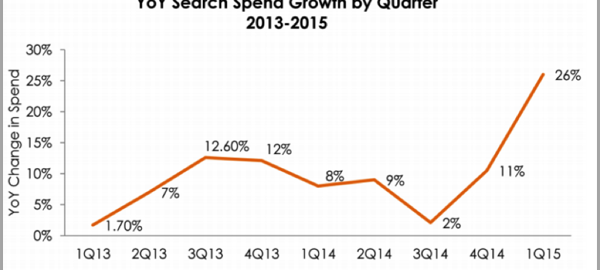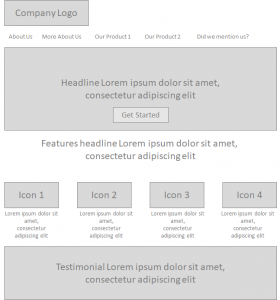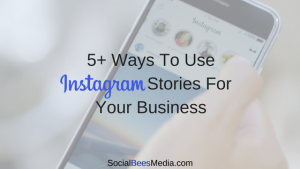
It’s a battle that is heating up (but has been going on for years).
Everyone seems to have a different opinion or way of looking at it.
So what’s the best way to spend your marketing budget; search engines or social media?
Paid ad spend has been strong in 2015, with the US market seeing 26% growth year on year, whilst growth in PPC budgets from existing users continues to grow at around 70% year on year (as way of contrast only 6% of businesses actually report using search advertising to drive website traffic).

Social spend in comparison has also been rising consistently, hitting 27% last year and is expected to hit 29% in 2015 ($ 19.5 billion).
In mobile, search still dominates, with Google receiving over 3.5 billion searches each day, and continuing to dominate mobile ad revenues, collecting 35% in the U.S, compared to Facebook’s 17%.

Digital ad spend on the whole across search, social and mobile has never been greater, and it is only going to grow as web usage worldwide, especially mobile, continues to grow. In fact, advertising revenues are expected to grow 10.7% annually to reach $ 194.5 billion by 2018 (just $ 20 billion behind predicted TV advertising growth).

Statistics aside for a moment, it pays to take some time to think about which is the superior marketing strategy for you; search vs social?
To really answer that question will depend a lot on the nature of your business, your customers and what you are trying to achieve.
Social networks
There’s no escaping the huge growth of social media and the ability for it to get your ads or content in front of a lot of people.
Its power to influence consumer decisions and generate leads for B2C and B2B is certainly in evidence as well (54% of B2B respondents in a CMO study said they’d generated leads via social media). But proponents of search ads will point to a lack of ‘intent’ in social media users and less reliable conversions as a result.
Pros
- You don’t have to guess at your audience. Their gender, age, location, interests, work, friends and so much more is provided for you. Discovering your target demographic has never been easier.
- Peer endorsements can mean an instant conversion. 75% of individuals aged 18 – 26 use recommendations on social networks when deciding on a product.
- Your reputation is in your hands. With social networks, your positive response to a negative review is not merely instantaneous, but how you handle the situation is witnessed by a broad web audience.
- It nurtures brand loyalty. 71% of consumers are more likely to make purchasing decisions based on what they discover about brands on social media. Making social media a great opportunity for create life-long customers.
Cons
- A large number of consumers don’t have a social profile. Unless you know that your target audience is on social media, you could be throwing advertising money down the drain.
- Most users of a social network are there to ‘socialise’, not to shop. As a result, your conversion rates on social networks are going to be a lot lower than search where ‘intent’ is more implicit.
- It can be time consuming, with up to 64% of digital marketers spending six hours or more on social media each day.
- It is incredibly difficult to set metrics and define your return-on-investment (ROI). Social media can be great for business, but with few direct conversions it is difficult to determine exactly how it is profiting your brand.
Search engines
Search is, and remains, the most powerful and trackable medium for digital advertisers with tried and tested methods for generating traffic and measuring conversions and ROI.
Critics will point to the increasing cost of PPC on platforms like Google Adwords, as a result of fierce competition over competitive keywords. This aside though, search advertising remains one of the most popular options for advertisers.
Pros
- Most consumers who discover your brand through a search engine are there with the intent to buy, resulting in increased traffic and higher conversions.
- Search allows for targeted marketing. You don’t have to go out looking for your target audience; the keywords they use direct them to you.
- Using analytics you can find out exactly what words and phrases consumers are searching for and alter your keywords accordingly. There may, for instance, be 50,000 consumers searching for ‘dog restraints’, but over two million users looking for ‘dog leashes’.
- If you don’t have the time, or expertise, to raise your site’s profile in organic listings, paid ads allow you a practical way to get your brand and products in the SERPs.
Cons
- Competition is fierce. It requires a substantial investment of resources and time, especially in a world where SEO algorithms are continuously changing.
- No guarantees. It’s been shown that 75% of searchers are unlikely to scroll past the first page so if your brand isn’t able to compete at the top, either in organic or paid, then some of those competitive keywords you really wanted to rank for may be out of reach indefinitely.
- It pays to rank well for organic search as well as for ads, but with link building and other SEO tactics, ROI isn’t instantaneous. SEO is an investment and it can take a long time before you see the results of your efforts.
So where should you invest your marketing budget: Search vs Social?
Well the get out of jail free answer is surely; why not both? Your customers are probably using both and the existing infrastructures of search and social are already beginning to merge.
Good social media habits can help to boost your organic rankings, while new social network advertising options can reveal a lot of information on keywords, target audiences and competitor activity, which in turn can feed back into your paid search campaign.
Social networking, after all, is terrific at building brand awareness and establishing credibility, whereas search is better at creating conversions.
A consumer is going to be much more likely to click your ad if they recognize your brand name from social media.
Used together, social and search can quickly become greater than the sum of their parts.
Digital & Social Articles on Business 2 Community(143)
Report Post





